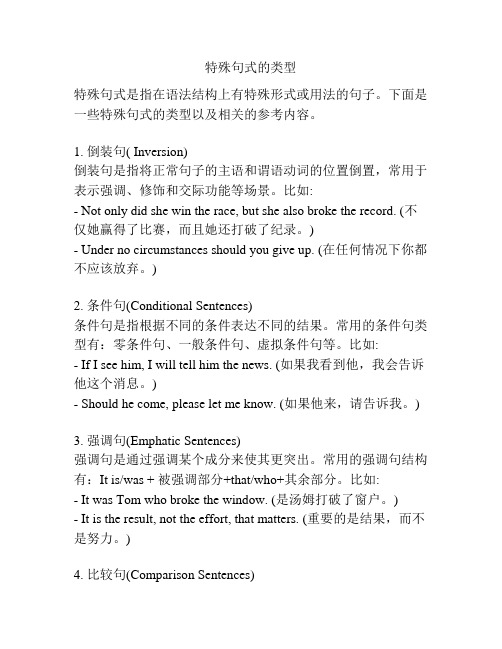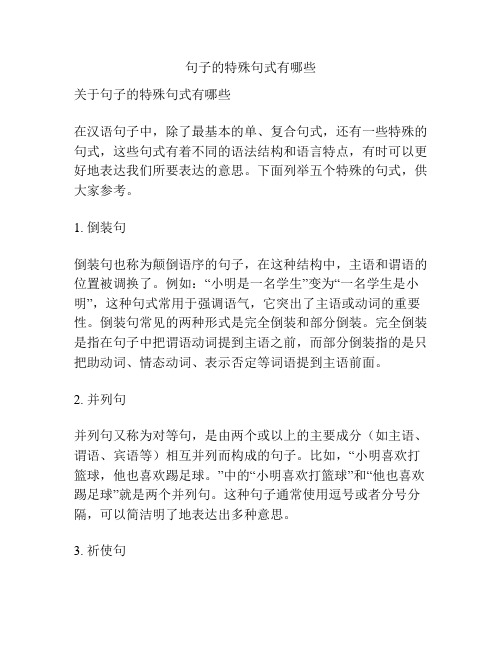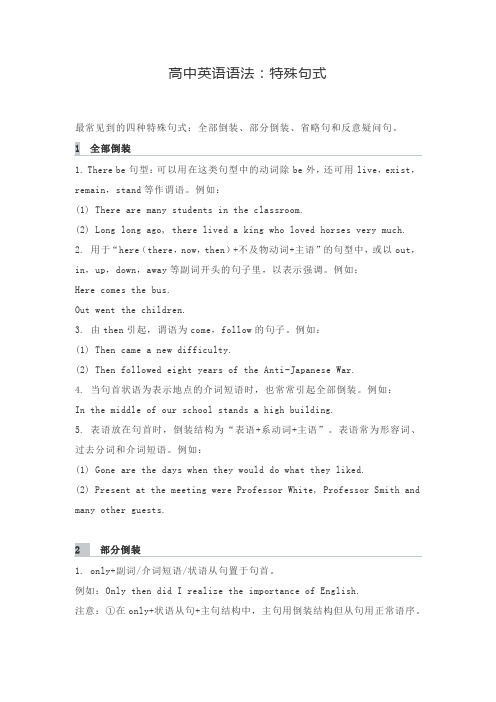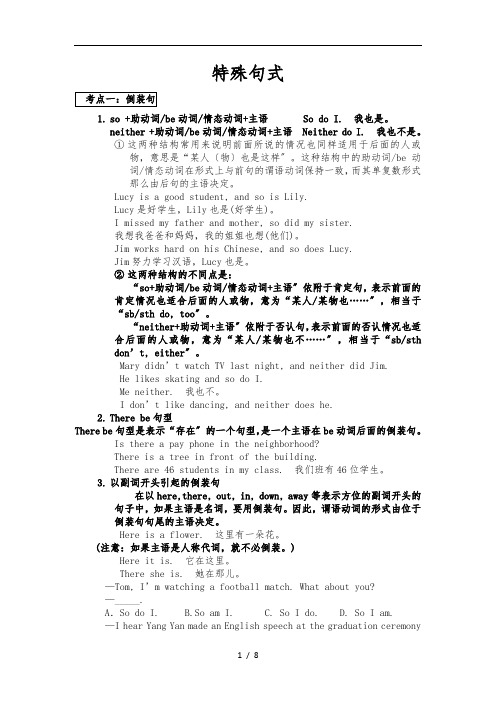特殊句型
英语特殊句式

英语特殊句式特殊句式(省略、倒装句、强调句)◆省略是一种修辞手法,用于避免重复一、简单句中的重复1. 省略主语1). 祈使句中主语的省略*(You)don’t touch me.不要碰我*(You)pass me the ticket, will you?把票递给我,好吗?* Beg your pardon.对不起,请原谅。
2. 省略谓语【经济学人高频】*Some of us studyEnglish; others (study) French.3. 疑问句的简略回答。
——Are you adoctor? 你是医生吗?——Yes, I am (adoctor). 是的,我是。
4. 感叹句中的省略。
*What a good time(we had) yesterday!昨天我们玩得很开心!5. 特殊疑问句中的省略(只对所问作针对性的回答)。
——Which book doyou want? 你想要哪一本书?——The one on thedesk. 书桌上的那本。
6. 所有格后的名词表示处所时,可以省略。
*He stayed at hisuncle’s (house) rather than mine in hischildhood. 他小时候住在叔叔家,而不是我家。
二、并列句中的省略1). 省略共同的主语或宾语。
*Mr Smith pickedup a coin on the road and (Mr Smith) handed it to a policeman. 史密斯先生在路上拾起一枚硬币,并把它交给了一位警察。
2). 若主语不同而其后的助动词、情态动词相同,则省略后面的助动词或情态动词。
*Jack must have beenplaying football and Mary (must have been) doing her homework. 杰克肯定一直在踢足球,玛丽在写作业。
3). 若句子中前半句与后半句的主语与谓语动词相同,则省略后面的谓语成分。
英语的特殊句式

英语的特殊句式英语中有一些特殊的句式结构,以下是几个常见的特殊句型:强调句型 (Emphatic Structure)通常采用"It is/was + 强调部分 + that/who + 其他部分"的结构。
示例:It was in China that Tom first met Mr. Lin.It's not what he said but the way he said it that matters.否定词“not”与“until”的强调用法当用于时间状语从句时,"not until"位于句首构成倒装结构以强调时间点。
正常句:He didn't go back home until midnight.强调句:It was not until midnight that he went back home.疑问形式的强调句特殊疑问词(如what, when, where等)+ be动词 + it + that + 其他部分示例变问句:Where was it that you got to know her?省略形式在口语或非正式书面语中,强调句中的"that"有时可以被省略,但不影响理解其为强调句。
如:They couldn't say what it was that troubled them.定语从句的强调强调定语从句的内容时,也可以使用强调句型。
示例:It's not who is right but what is right that is of importance.被动语态强调被动语态中也可用来强调动作的承受者。
示例:It is this book that is widely read by students.比较级句型的强调使用 "no...more than", "not so much...as" 等结构来强调比较对象的相对性。
英语中的特殊句型

英语中的特殊句型
- It is (is/has been) two years since he left China. 他离开中国已经两年了。
- It is (is) the first time that I have visited Shanghai. 这是我第一次来上海。
- Where there is a will, there's a way. 有志者事竟成。
- The workforce is made up of 400 workers, most of them women. 这个团队由400名工人组成,其中大多数是女性。
- The street wet and slippery, we had to ride our bikes slowly and carefully. 街道又湿又滑,我们不得不小心缓慢地骑自行车。
- He put on his coat hurriedly, the wrong side out. 他匆忙穿上外套,却把里面穿反了。
- The old man was seated in the sofa, a pipe in his mouth. 老人坐在沙发上,嘴里叼着烟斗。
- With so many problems to settle, the newly-elected president is having a hard year. 有这么多问题要解决,新当选的总统过得很艰难。
这些特殊句型在英语中具有重要的作用,可以使句子更加生动、有趣和富有表现力。
如果你想了解更多关于英语特殊句型的信息,请继续向我提问。
特殊句式的类型

特殊句式的类型特殊句式是指在语法结构上有特殊形式或用法的句子。
下面是一些特殊句式的类型以及相关的参考内容。
1. 倒装句( Inversion)倒装句是指将正常句子的主语和谓语动词的位置倒置,常用于表示强调、修饰和交际功能等场景。
比如:- Not only did she win the race, but she also broke the record. (不仅她赢得了比赛,而且她还打破了纪录。
)- Under no circumstances should you give up. (在任何情况下你都不应该放弃。
)2. 条件句(Conditional Sentences)条件句是指根据不同的条件表达不同的结果。
常用的条件句类型有:零条件句、一般条件句、虚拟条件句等。
比如:- If I see him, I will tell him the news. (如果我看到他,我会告诉他这个消息。
)- Should he come, please let me know. (如果他来,请告诉我。
)3. 强调句(Emphatic Sentences)强调句是通过强调某个成分来使其更突出。
常用的强调句结构有:It is/was + 被强调部分+that/who+其余部分。
比如:- It was Tom who broke the window. (是汤姆打破了窗户。
)- It is the result, not the effort, that matters. (重要的是结果,而不是努力。
)4. 比较句(Comparison Sentences)比较句是用来比较两个对象或者描述相对关系的句子。
常用的比较句结构有:as+adj./adv. +as, not as+adj./adv.+as,more/less+adj./adv.+ than等。
比如:- He runs as fast as a cheetah. (他跑得像一只猎豹一样快。
英语特殊句型

以前我从未看过这么感人的电影。 Not a single mistake did he make.=He didn't make a single mistake. 他一个错误也没犯。
专项语法十五 特殊句式
要点精析
一、倒装
1.完全倒装
谓语动词完全搬到主语之前的句子,便 是完全倒装句。这类句型主要有两种:
(1)表示方式或方位的副词或介词短语, 如here, there, now, then, up, down, in, away, off, out, in the room, on the wall等, 置于句首时。
只有以这种方法,我们才能学好英语。
Only when he returned did we find out the truth.
注意:only修饰主语时,句子不可倒装。
Only you can solve the problem.
只有你能解决这个问题。
(2)否定副词never, nor, not, hardly, little, seldom, scarcely, rarely及表否定意义的介 词短语at no time, under/in no circumstances, in no case, by no means, on no condition等置于句首时。
So dark was it that he couldn't see the faces of his companions.
天这么黑,他看不见同伴的脸。
英语特殊句型结构大全

英语特殊句型结构大全1. 否定句型结构(Negative sentence structure)主语 + 动词 + not + 宾语(或补语)例如:I do not like coffee. (我不喜欢咖啡。
)2. 疑问句型结构(Question sentence structure)(1)一般疑问句助动词(be、do、have等)+ 主语 + 其他?例如:Are you happy? (你开心吗?)(2)特殊疑问句疑问词(what、where、when、why、who等)+ 助动词(be、do、have等)+ 主语 + 其他?例如:What are you eating? (你在吃什么?)3. 倒装句型结构(Inverted sentence structure)(1)全部倒装助动词、be动词或情态动词 + 主语 + 谓语动词(不带to)+ 其他?例如:Never have I seen such a beautiful sunset. (我从未见过如此美丽的日落。
)(2)部分倒装表示否定的词(hardly、never、seldom、not等)+ 谓语动词 + 主语 + 其他?例如:Seldom do I have time to read novels. (我很少有时间读小说。
)4. 强调句型结构(Emphatic sentence structure)主语 + 动词 + bet/fact/matter + 疑问词/that + 句子其他部分例如:It is not what you said, but the way you said it that hurt my feelings. (伤害我的是你说话的方式,而非你说的话。
)5. 假设句型结构(Conditional sentence structure)(1)真实条件句If/Unless + 现在时态,将来时态,一般过去时态,过去将来时态(虚拟语气)+ 主语 + 谓语例如:If it rains tomorrow, we will stay at home. (如果明天下雨,我们就呆在家里。
五种特殊句型

五种特殊句型一、祈使句(一)祈使句的肯定句式一般分为以下三种类型:1.行为动词原形+其它成分。
例如:Make sentences after the model.根据例句造句。
2. Be动词+其它成分(形容词、名词或介词短语等)。
例如:Be careful when crossing the street.过马路时要小心。
3. Let+宾语+动词原形+其它成分。
例如:Let him go back now.让他现在回去吧。
(二)祈使句的否定句式,通常情况下在句首加上Don’t或Never,一般分为以下三种类型:1.在祈使句的肯定句式前加Don’t,构成Don’t+行为动词原形+其它成分。
例如:Don’t say that again!别再那样说了!2.在Be动词引起的肯定祈使句前加Don’t,构成Don’t be+其它成分(形容词、名词或介词短语等)。
例如:Don’t be careless.不要粗心。
注意:在这种句型中be不能省略;否定副词not不可置于be之后。
3.在公共场合的提示语中,否定祈使句常用No+名词/V-ing形式结构,表示禁止做某事。
例如:NO PHOTOS!禁止拍照!(三)祈使句的回答祈使句的动作通常是表示将来发生的动作,所以回答祈使句时,一般用will或won’t。
在回答具有否定意义的祈使句时,要注意两点:一是形式一致,即Yes与will保持一致;No与won’t保持一致。
二是意思相反,即Yes是不的意思;No是“是”的意思。
在回答时,要注意分析上下文语境中所提供的条件。
--- Don’t go out, please. It’s raining heavily outside.---- Yes, I will. I have to meet my brother at the airport.二、感叹句表示喜、怒、乐等强烈感情时用感叹句。
感叹句分为两种:一种以what引导,一种以how 引导。
现代汉语特殊句式完整版

现代汉语特殊句式 HEN system office room 【HEN16H-HENS2AHENS8Q8-HENH1688】现代汉语中特殊句式有六种,分别是:把字句、被字句、连动句、兼语句、是字句(判断句)、存现句、。
[口诀]把被连,兼是现。
1、把字句把字句是一种用“把”字将宾语提前并与宾语一起构成句子的状语的特殊句式。
这种句式使得语句的表达变得灵活多样,也为诗歌等韵文的押韵提供了方便。
值得注意的是除了“把”字,还可以用“将”等虚词起到这样的作用。
例如:我把我的作文本忘在家里了。
他把他人生的黄金时期硬是这样虚度过去了。
林觉民把自己的一生凝固成了光照千秋的历史册页。
我手执钢鞭将你打!他早已将生死置之度外了。
[注意]把字句的本质就是将宾语前置,与介词“把”一起构成句子的状语。
在句式变换中,把字句是一种最基本的变换样式,也是最简单的变换,但是在写作中,它为语言表达提供了极大的方便2、被字句被字句(也称“被动句”)是一种用“被”字变施事者(正常的语序中是主语,相应的宾语就被称为“受事者”)为状语或者用“被”字表示受事者所受的动作、行为的特殊句式。
如:我被这突如其来的事情给吓懵了。
/ 我被吓懵了。
我被李老师这重重的一掌给打醒了。
/ 我被打醒了。
我被《疯娘》这篇文章深深地感动了。
/ 我被深深地感动了敌人被我们打败了。
/ 敌人被打败了。
他被公司开除了。
/ 他被开除了。
[注意]被字句的本质是表示受事者所受到的动作、行为,突出的是受事者,所以有时候说出施事者,有时候不说出施事者,这要看表达的重点是什么了。
另外,在句式变换中,这是非常重要的一种形式。
比如在“主动句和被动句的变换”、“突出句子的某一表达重点”,被字句就是非常必需的。
例如:改变下列句子的句式,强调我方无辜。
美国军用侦察机在我国南海上空把由王伟驾驶的我国一架军用飞机撞毁了。
改写成为被动句:答案:由王伟驾驶的我国一架军用飞机在我国南海上空被美国军用侦察机撞毁了。
句子的特殊句式有哪些

句子的特殊句式有哪些关于句子的特殊句式有哪些在汉语句子中,除了最基本的单、复合句式,还有一些特殊的句式,这些句式有着不同的语法结构和语言特点,有时可以更好地表达我们所要表达的意思。
下面列举五个特殊的句式,供大家参考。
1. 倒装句倒装句也称为颠倒语序的句子,在这种结构中,主语和谓语的位置被调换了。
例如:“小明是一名学生”变为“一名学生是小明”,这种句式常用于强调语气,它突出了主语或动词的重要性。
倒装句常见的两种形式是完全倒装和部分倒装。
完全倒装是指在句子中把谓语动词提到主语之前,而部分倒装指的是只把助动词、情态动词、表示否定等词语提到主语前面。
2. 并列句并列句又称为对等句,是由两个或以上的主要成分(如主语、谓语、宾语等)相互并列而构成的句子。
比如,“小明喜欢打篮球,他也喜欢踢足球。
”中的“小明喜欢打篮球”和“他也喜欢踢足球”就是两个并列句。
这种句子通常使用逗号或者分号分隔,可以简洁明了地表达出多种意思。
3. 祈使句祈使句也称为命令句,是表达命令、请求或建议的一种句型。
这种句子通常省略了主语,使用动词原形或者动词不定式,如:“过来!”、“请你帮我一下。
”、“不要挂断电话。
”这种句子通常灵活简洁,语气强烈,是生活中常用的一种句子结构。
4. 疑问句疑问句是指询问对方或自己是否了解某事的句子结构,其语调和词序都有所变化。
疑问句分为直接疑问句和间接疑问句。
直接疑问句是直接用疑问词提问,如“你在哪里?”而间接疑问句则由疑问句转述而来,如“我想知道你在哪里。
”5. 广义修饰句广义修饰句是由动词、形容词、副词、介词短语、不定式短语等修饰成分加上定语从句,构成一个复杂的修饰结构。
对于这种结构的句子,我们需要仔细分析句子成分之间的关系,找出主句和定语从句,才能完整理解其含义。
如:“他发现那个女孩,她和他小时候住在同一层楼。
”中的“那个女孩”是主句的宾语,而“她和他小时候住在同一层楼”是定语从句进一步修饰“那个女孩”。
英语万能公式的四大特殊句型

英语万能公式的四大特殊句型1、强调结构:It is you who I love. 强调宾语It is I who love you.强调主语It is when I was a child that I fell in love with you.强调状语注意:强调结构与it做形式主语的区别:如果把“It is...that...”这一部分去掉时,剩下的部分仍然能组成一个完整的句子,那么这个句子就是强调句型。
如果去掉以后,不能再组成一个完整的句了,就是it做形式主语的结构。
比如:It is you who I love. 去掉“It is...that...”后,句子还是可以写成:I love you.这个句子绝对是强调句。
It is necessary that we should study hard.去掉“It is...that...”后,剩下的成分就不能再重新组合成一个新句子,因此这个句子是It做形式主语。
It is under the correct wise leadership of Communist Party of China that we live a happy life.在句了强调谓语动词时,通常是在动词前加助动词do。
I do love you. He does study hard.2、倒装句型1)so、介词短语、方位副词放在句首时,全部倒装。
Tom likes to play football, so do I.In the room are 150 students.2)only+状语+句子Only by (taking) a training class can we pass TDXL examination.Only in this way can we solve the traffic problems in Beijing city.Only when we grow up do we realize how kind our parents are to us.3)否定词、否定短语放在句首时,用部分倒装never, nowhere、by no means, at no time、on no account,under no circumstances, not only...but also...4)if虚拟条件句中,省略了if时。
特殊句式

problem.
只有用这种方法你才能解决问题。
7.so,neither,nor放在句首时,表示主语与前面 的主语状态相同时,用部分倒装。 8.表语、状语或动词原形+as/though+主语+其 他时,句子要倒装。 Hero as he is,he still has shortcomings.
一句型。 感叹句 1.What+a/an+形容词+单数可数名词+主语+谓 语!
2.What+形容词+复数名词+主语+谓语!
3.How+形容词/副词+主语+谓语! 4.How+形容词+a/an+单数可数名词+主语+谓语! (有时how直接修饰谓语动词:How+主语+谓语!)
反意疑问句 反意疑问句的一般应用规则是:前肯定后否定;
He must have met her yesterday,didn’t he?
他昨天一定见过她,不是吗? You must have seen the film,haven’t you?
你一定看过这部电影,不是吗?
3.当陈述部分有 seldom,hardly,few,little,no,never,nothing,nobod y,nowhere等否定词时,疑问部分要用肯定形式。当
(3)带补语的动词:
tell,ask,order,allow,permit,expect,wish,force, warn,forbid,persuade,etc. He doesn’t visit me as much as he used to. 他不像以前那样经常来看我了。
高中英语语法:特殊句式

高中英语语法:特殊句式最常见到的四种特殊句式:全部倒装、部分倒装、省略句和反意疑问句。
1 全部倒装1. There be句型:可以用在这类句型中的动词除be外,还可用live,exist,remain,stand等作谓语。
例如:(1) There are many students in the classroom.(2) Long long ago, there lived a king who loved horses very much.2. 用于“here(there,now,then)+不及物动词+主语”的句型中,或以out,in,up,down,away等副词开头的句子里,以表示强调。
例如:Here comes the bus.Out went the children.3. 由then引起,谓语为come,follow的句子。
例如:(1) Then came a new difficulty.(2) Then followed eight years of the Anti-Japanese War.4. 当句首状语为表示地点的介词短语时,也常常引起全部倒装。
例如:In the middle of our school stands a high building.5. 表语放在句首时,倒装结构为“表语+系动词+主语”。
表语常为形容词、过去分词和介词短语。
例如:(1) Gone are the days when they would do what they liked.(2) Present at the meeting were Professor White, Professor Smith and many other guests.2 部分倒装1. only+副词/介词短语/状语从句置于句首。
例如:Only then did I realize the importance of English.注意:①在only+状语从句+主句结构中,主句用倒装结构但从句用正常语序。
特殊句式

判断方法:将(It is/was)...(that/who)…括 号中的词同时去掉,看剩下的部分是否仍然成立。 若成立,则是强句型;若不成立,则为状语从 句、定语从句或主语从句。
2.祈使句: 祈使句的主语是you,但一般被省略;当前面有 呼语时,一般得补出主语you;否定式一般是在前 面加Don’t。 “祈使句,+and/or+句子” 叫做祈使条件句, 其中后面的句子常为一般将来时的陈述句。此句 式的考点: 1、考察句首的动词原形。 2、考察中间连接词的选择。 3、考察后面陈述句的时态。
6省略句 熟悉并掌握一些特殊的省略形式。 A.在时间、条件、让步等状语从句中,当从 句的主语跟主句的主语一致时,从句中有be 的形式时,可以省略从句的主语和be形式。 B.在时间、地点、条件、让步等状语从句中, 当从句的主语是it,谓语是be动词时,从句的 主语、谓语可以省略。如:When/Where/ If necessary/so/possible
3.感叹句: 句型: what +a(n)+adj +n.+主语+be! How +adj/adv.+主语+动词! 考点: 1、what和how的选择。 2、adj和n的位置。
4. There be句型: 注意动词的形式;注意主语补足语的形式。 注意there be和 have不能混用。
5.倒装句:倒装分为全部倒装和部分倒装。 全部倒装:地点副词或介词短语+动词+主语 (名词);地点副词或介词短语+主语(代词)+动 词。 部分倒装: (1)否定词或半否定词+助动词/情态动词+主 语+谓语动词+其它。 (2)only+副词(状语) (3)结果、目的状语从句中的such,so提到句 首时的倒装。
特殊句型

(3)当 only 修饰副词、介词短语或状语从句位于句 首时。
Only then did I find I have made a mistake. 到那时我才发现犯了个错。 (4)在 so/such...that...从句中,当 so+形容词/副词 或 such+名词位于句首时。
Little does he care about what others think. 他很少在乎别人是怎么想的。 (2)在 not...until...,no sooner...than...,scarcely/hardly ...when...,not only...but also...,neither...nor...等句式中。
There goes the phone.I’ll answer it. 电话响了,我去接。
(3)such 作表语置于句首时。 Such was Albert Einstein,a simple man but the 20th century’s greatest scientist. 这就是艾伯特·爱因斯坦,一个普通的人但却是二 十世纪最伟大的科学家。 (4)直接引语的全部或部分位于句首时。 “If you die,who will get your money?” asked
So exhausted was she that she wanted to have a rest.她如此地疲惫以致于想休息一会儿。
(5)当表示前面所说的情况也适用于另一个人或事物时, 常用 so/as+系动词/助动词/情态动词+主语,表示“……也 是……”。
Times have changed and so have I. 时代变了,我也变了。 Eve’s very tall,as was her mother. 伊芙长得挺高,她的妈妈也是。 (6)当 neither,nor 位于句首,表示前面否定的内容也适 用于另一个人或事物时,常用 neither/nor+系动词/助动词/ 情态动词+主语,表示“……也不……”。 They couldn’t understand it at that time,and nor could we.那时他们不能理解,我们也不理解。
英语八大特殊句式

英语八大特殊句式英语八大特殊句式一、主句+not…until…句型not…until…句型是一个倒装句,意思是“直到……才……”,not是部分否定,表示强调。
例句:I didn't go home until midnight.直到半夜我才回家。
二、It+be+形容词+that…句型此句型是强调句型,能形象准确表达出句子的意思,使句子语气更加强烈。
例句:It was amazing that he finished the work in such a short time.令人惊讶的是他竟然用如此短的时间就完成了这项工作。
三、not…until+从句句型not…until+从句句型表示内容得以实现的时间,或是强调情况发生的先后,通常译为“直到……才……”。
例句:I didn't know the news until he told me.直到他告诉我我才知道这个消息。
四、No…without+名词/代词句型No…without…句型表示肯定的含义,意思是“没有……就没有……”,常用在客观事实上。
例句:No success without hard work.没有努力就没有成功。
五、little+比较级/最高级+than句型此句型在主句中有肯定含义,常用在客观事实上,表示“……比……稍微……”。
例句:I'm a little younger than he is.我比他稍微年轻一点。
六、It+be+形容词+of+sb.+to do sth.句型此句型是结构严谨、表达精准的句型,将句子的客观内容与主观评价紧密连接在一起。
例句:It was very kind of you to help me.你帮助我真的很好。
七、it+be+宾语+that从句句型此句型可以表达出主句的肯定和客观,把主句和从句有机地结合在一起,而从句又可以表达句子的主观意见。
例句:It is important that we protect the environment.我们保护环境很重要。
现代汉语特殊句式

现代汉语中特别句式有六种,分别是:把字句、被字句、连动句、兼语句、是字句(判断句)、存现句、。
[ 口诀 ] 把被连,兼是现。
1、把字句把字句是一种用“把” 字将宾语提早并与宾语一同组成句子的状语的特别句式。
这类句式使得语句的表达变得灵巧多样,也为诗歌等韵文的押韵供给了方便。
值得注意的是除了“把”字,还能够用“将”等虚词起到这样的作用。
比如:我把我的作文本忘在家里了。
他把别人生的黄金期间硬是这样虚度过去了。
林觉民把自己的一世凝结成了光照千秋的历史册页。
我手执钢鞭将你打!他早已将存亡置之度外了。
[ 注意 ] 把字句的实质就是将宾语前置,与介词“把”一同组成句子的状语。
在句式变换中,把字句是一种最基本的变换款式,也是最简单的变换,可是在写作中,它为语言表达供给了极大的方便2、被字句被字句(也称“被动句”)是一种用“被”字变施事者(正常的语序中是主语,相应的宾语就被称为“受事者”)为状语或许用“被”字表示受事者所受的动作、行为的特别句式。
如:我被这忽如其来的事情给吓懵了。
/我被吓懵了。
我被李老师这重重的一掌给打醒了。
/我被打醒了。
我被《疯娘》这篇文章深深地感人了。
/ 我被深深地感人了仇敌被我们战胜了。
/ 仇敌被战胜了。
他被企业开除了。
/他被开除了。
[ 注意] 被字句的实质是表示受事者所遇到的动作、行为,突出的是受事者,所以有时说出施事者,有时不说出施事者,这要看表达的要点是什么了。
此外,在句式变换中,这是特别重要的一种形式。
比方在“主动句和被动句的变换”、“突出句子的某一表达要点”,被字句就是特别必要的。
比如:改变以下句子的句式,重申我方无辜。
美国军用侦探机在我国南海上空把由王伟驾驶的我国一架军用飞机撞毁了。
改写成为被动句:答案:由王伟驾驶的我国一架军用飞机在我国南海上空被美国军用侦探机撞毁了。
3、连动句连动句是一种一个主语带有两个或两个以上在逻辑上密切连结的谓语的特别句式,也能够说连动句是由连动短语充任谓语的特别句式。
特殊句式讲解

特殊句式1.so +助动词/be动词/情态动词+主语 So do I. 我也是。
neither +助动词/be动词/情态动词+主语 Neither do I. 我也不是。
①这两种结构常用来说明前面所说的情况也同样适用于后面的人或物,意思是“某人〔物〕也是这样〞。
这种结构中的助动词/be动词/情态动词在形式上与前句的谓语动词保持一致,而其单复数形式那么由后句的主语决定。
Lucy is a good student, and so is Lily.Lucy是好学生,Lily也是(好学生)。
I missed my father and mother, so did my sister.我想我爸爸和妈妈,我的姐姐也想(他们)。
Jim works hard on his Chinese, and so does Lucy.Jim努力学习汉语,Lucy也是。
②这两种结构的不同点是:“so+助动词/be动词/情态动词+主语〞依附于肯定句,表示前面的肯定情况也适合后面的人或物,意为“某人/某物也……〞,相当于“sb/sth do, too〞。
“neither+助动词+主语〞依附于否认句,表示前面的否认情况也适合后面的人或物,意为“某人/某物也不……〞,相当于“sb/sthdon’t, either〞。
Mary didn’t watch TV last night, and neither did Jim.He likes skating and so do I.Me neither. 我也不。
I don’t like dancing, and neither does he.2.There be句型There be句型是表示“存在〞的一个句型,是一个主语在be动词后面的倒装句。
Is there a pay phone in the neighborhood?There is a tree in front of the building.There are 46 students in my class. 我们班有46位学生。
英语语法之特殊句式

英语语法之特殊句式特殊句型特殊句型包括祈使句、感叹句、强调句型、反意疑问句和There be句型。
祈使句祈使句用于表示请求、命令、建议或劝告等。
一般使用降调,为使语气婉转,可使用低升调。
句末使用句号或感叹号。
肯定的祈使句:关上门。
请安静!有时为了加强语气,可以在动词之前加上do,表示“务必,一定”。
一定要按时来。
一定要小心!否定的祈使句:祈使句的否定形式一般是在句首加don’t或never构成。
不要迟到。
做事不可马虎。
其他形式的祈使句:以let开头的祈使句:咱们休息一会。
我们不要大声说话。
以no开始的禁止性祈使句:禁止停车。
禁止吸烟。
祈使句+陈述句句型:在“祈使句+陈述句”这种结构中,祈使句和陈述句之间要用连接词。
连接词分为两类:第一类:and。
then。
and then。
意思是“就”、“那么(就)”、“(刚)才“。
第二类:or。
or else。
otherwise。
意思是“否则”、“要不”、“不然的话”。
使用and和or的方法:选择连接词,只看陈述句。
and叫人心欢畅,or的后果不好尝。
使用第一类连接词和第二类连接词的方法:比较下面三组例句:1)Come early。
and you’ll catch the first bus.早点来,你就能赶上第一班汽车。
Come early。
or you’ll miss the first bus.来早点,不然的话,你就赶不上第一班汽车。
2)Use your head。
then you’ll find a way.开动脑筋,那么你就会找到办法。
Use your head。
or else you won’t find a way.开动脑筋,否则,你就找不到办法。
Work hard。
otherwise you will fail。
This shows that when stating the desired e。
one should use "and"。
- 1、下载文档前请自行甄别文档内容的完整性,平台不提供额外的编辑、内容补充、找答案等附加服务。
- 2、"仅部分预览"的文档,不可在线预览部分如存在完整性等问题,可反馈申请退款(可完整预览的文档不适用该条件!)。
- 3、如文档侵犯您的权益,请联系客服反馈,我们会尽快为您处理(人工客服工作时间:9:00-18:30)。
九峰中学高三英语集体备课教案备课人:余丽君备课时间:2013,11语法复习:句子成分;简单句、并列句和复合句一、句子成分(一)句子成分的定义:构成句子的各个部分叫做句子成分。
句子成分有主要成分和次要成分;主要成分有主语和谓语;次要成分有表语、宾语、定语、状语、补足语和同位语。
(二)主语:主语是一个句子所叙述的主体,一般位于句首。
但在there be结构、疑问句和倒装句中,主语位于谓语、助动词或情态动词后面。
主语可由名词、代词、数词、不定式、动名词、名词化的形容词和主语从句等表示。
例如:During the 1990s, American country music has become more and more popular.(名词)We often speak english in class.(代词)One-third of the students in this class are girls.(数词)To swim in the river is a great pleasure.(不定式)Smoking does harm to the health.(动名词)The rich should help the poor.(名词化的形容词)When we are going to have an English test has not been decided.(主语从句)It is necessary to master a foreign language.(it作形式主语,真正的主语为后面的不定式)(三)谓语:谓语说明主语所做的动作或具有的特征和状态。
动词在句中作谓语,一般放在主语之后。
谓语的构成如下:1、简单谓语:由一个动词或动词短语构成。
如:He practices running every morning.2、复合谓语:由情态动词或其他助动词加动词原形构成。
如:You may keep the book for two weeks. He has caught a bad cold.(四)表语:表语用以说明主语的身份、特征和状态,它一般位于系动词(如be, become, get, look, grow, turn, seem等)之后。
表语一般由名词、代词、形容词、分词、数词、不定式、动名词、介词短语、副词及表语从句表示。
例如:Our teacher of English is an American.(名词)Is it yours? (代词)The weather has turned cold.(形容词)The speech is exciting.(分词)Three times seven is twenty one?(数词)His job is to teach English.(不定式)His hobby(爱好)is playing football.(动名词)The machine must be out of order.(介词短语)Time is up. The class is over.(副词)The truth is that he has never been abroad.(表语从句)(五)宾语:宾语表示动作的对象或承爱者,一般位于及物动词和介词后面。
例如:They went to see an exhibition(展览)yesterday.(名词)The heavy rain prevented me from coming to school on time.(代词)How many dictionaries do you have? I have five.(数词)They helped the old with their housework yesterday.(名词化形容词)He pretended not to see me.(不定式短语)I enjoy listening to popular music.(动名词短语)I think(that)he is fit for his office.(宾语从句)宾语种类:(1)双宾语(间接宾语+直接宾语),例如:Lend me your dictionary; please.(2)复合宾语(宾语+宾补),例如:They elected him their monitor.(六)宾语补足语:英语中有些及物动词,除有一个直接宾语以外,还要有一个宾语补语,才能使句子的意义完整。
带有宾语补足语的一般句型为:某些及物动词(如make等+宾语+宾补)。
宾补可由名词、形容词、副词、不定式、分词、介词短语和从句充当。
例如:His father named him Dongming.(名词)They painted their boat white.(形容词)Let the fresh air in.(副词)You mustn’t force him to lend his money to you.(不定式短语)We saw her entering the room.(现在分词)We found everything in the lab in good order.(介词短语)We will soon make our city what your city is now.(从句)(七)定语:修饰名词或代词的词、短语或从句称为定语。
定语可由以下等成分表示:Guilin is a beautiful city.(形容词)China is a developing country; America is a developed country.(分词)There are thirty women teachers is our school.(名词)His rapid progressing English made us surprised.(代词)Our monitor is always the first to enter the classroom.(不定式短语)The teaching plan for next term has been worked out.(动名词)He is reading an article about how to learn English.(介词短语)(八)状语:修饰动词、形容词、副词或整个句子,说明动作或状态特征的句子成分,叫做状语。
可由以下形式表示:Light travels most quickly.(副词及副词性词组)He has lived in the city for ten years.(介词短语)He is proud to have passed the national college entrance examination.(不定式短语)He is in the room making a model plane.(分词短语)Wait a minute.(名词)Once you begin, you must continue.(状语从句)状语种类如下:How about meeting again at six?(时间状语)Last night she didn’t go to the dance party because of the rain.(原因状语)I shall go there if it doesn’t rain.(条件状语)Mr. Smith lives on the third floor.(地点状语)She put the eggs into the basket with great care.(方式状语)She came in with a dictionary in her hand.(伴随状语)In order to catch up with the others, I must work harder.(目的状语)He was so tired that he fell asleep immediately.(结果状语)She works very hard though she is old.(让步状语)I am taller than he is.(比较状语)练习一一、指出下列句子划线部分是什么句子成分:1. The students got on the school bus.2. He handed me the newspaper.3. I shall answer your question after class.4. What a beautiful Chinese painting!5. They went hunting together early in the morning.6. His job is to train swimmers.7. He took many photos of the palaces in Beijing.8. There is going to be an American film tonight.9. He is to leave for Shanghai tomorrow.10. His wish is to become a scientist.11. He managed to finish the work in time.12. Tom came to ask me for advice.13. He found it important to master English.14. Do you have anything else to say?15. To be honest; your pronunciation is not so good.16. Would you please tell me your address?17. He sat there, reading a newspaper.18. It is our duty to keep our classroom clean and tidy.19. He noticed a man enter the room.20. The apples tasted sweet.二、用符号划出下列短文各句中的主语(—)、谓语(=)、宾语(~):I hope you are very well. I'm fine, but tired. Right now it is the summer vacation and I'm helping my Dad on the farm. August is the hottest month here. It is the time of year for the rice harvest, so every day I work from dawn until dark. Sometimes we go on working after dark by the lights of our tractors. We grow rice in the south of the States, but in the north where it is colder they grow wheat. We have a lot of machines on the farm. Although the farm is large, my Dad has only two men working for him. Buthe employs more men for the harvest. My brother takes care of the vegetabl e garden. It doesn’t often rain in the summer here. As a result, we have to water the vegetable garden. Every evening we pump water from a well. It then runs along channels to different parts of the garden.三、用符号划出下列短文各句中的定语(—)、状语(=)、补语(~):Most Saturday evenings there is a party, even at harvest time. These parties often make us very happy. We cook meat on an open fire outside. It's great! Americans eat a lot of meat — too much in my opinion. Some of my friends drink beer. I don't, because I have to drive home after the party. In your letter you asked about the time in different areas of the States. There are five different time areas in the States. In my state we are fourteen hours behind Beijing time. How many different time areas do you have in China? Well, I must stop and get some sleep. Please give my best regards to your parents.四、选择填空:( ) 1. ____ will leave for Beijing.A. Now there the manB.The man here nowC. The man who is herenow D.The man is here now( ) 2. The weather ____.A. wet and coldB. is wet and coldC. not wet andcold D. were wet and cold( ) 3. The apple tasted ____.A. sweetsB. sweetlyC. nicelyD. sweet( ) 4. He got up____ yesterday morning.A. latelyB. lateC. latestD. latter( ) 5. The actor ______at the age of 70.A. deadB. diedC. dyedD. deaded( ) 6. ____ were all very tired, but none of ____ would stop to take a rest.A. We, usB. Us, weC. We, ourD. We, we( ) 7. He found the street much ______.A. crowdB. crowdingC. crowdedD. crowdedly ( ) 8.I think _____necessary to learn English well.A. itsB. itC. thatD. that is( ) 9. The dog____ mad.A. looksB. is lookedC. is being lookedD. was looked( )10.I will never forget the day ______ I joined the army.A. thatB. whenC. in whichD. where二、简单句、并列句和复合句(一)句子种类两种分类法1、按句子的用途可分四种:1)陈述句(肯定、否定):He is six years old; She didn’t hear of you before. 2)疑问句(一般、特殊、选择、反意):Do they like skating? How old is he? Is he six or seven years old? Mary can swim, can’t she?3)祈使句:Be care ful, boys; Don’t talk in class4)感叹句:How clever the boy is!2、按句子的结构可分三种:1)简单句:只有一个主语(或并列主语)和一个谓语(或并列谓语)。
